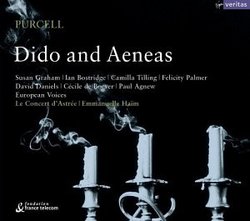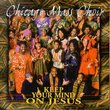| All Artists: Camilla Tilling Title: Purcell: Dido and Aeneas Members Wishing: 1 Total Copies: 0 Label: Virgin Veritas Release Date: 2/10/2004 Genre: Classical Styles: Opera & Classical Vocal, Chamber Music, Historical Periods, Baroque (c.1600-1750), Classical (c.1770-1830) Number of Discs: 1 SwapaCD Credits: 1 UPCs: 724354560521, 724354560552 |
Search - Camilla Tilling :: Purcell: Dido and Aeneas
 | Camilla Tilling Purcell: Dido and Aeneas Genre: Classical
This new, period instrument version of Purcell's wonderful, brief Dido and Aeneas shows up in a very crowded field. There are close to two dozen other versions available, many of them also historically informed. Here we ha... more » |
Larger Image |
CD DetailsSynopsis
Amazon.com This new, period instrument version of Purcell's wonderful, brief Dido and Aeneas shows up in a very crowded field. There are close to two dozen other versions available, many of them also historically informed. Here we have a dignified, beautifully sung reading, with instrumentalists performing with a similar sense of loveliness and reserve; indeed, the only time true overt emotionalism shows up is when the witches appear: Felicity Palmer is a nasty handful as the Sorceress. Susan Graham's Dido is elegant and, note-for-note, probably gives us among the best Didos on disc. Ian Bostridge's Aeneas is good without being outstanding; David Daniels and Paul Agnew make remarkable cameos. I prefer the performance led by René Jacobs or starring Janet Baker to this one for sheer drama, but you can't go wrong with Graham, et al, under Emmanuelle Haim's intensely musical leadership either. --Robert Levine Similarly Requested CDs
|
CD ReviewsVigorous Playing Overshadows the Drama Terry Serres | Minneapolis, MN United States | 09/01/2004 (4 out of 5 stars) "I am unable to jump on the bandwagon for this recording. It is indeed a must-listen ... fascinating from start to finish, but in the end the effectiveness of the drama is undermined by key choices. The playing is monstrous in the sense of revelatory ... Haim brings forth accents, rhythms, and textures you didn't know were there. The score is alive with thumping, strumming, and ornament. You really won't want to miss this reading, but for me it's not the one I will return to for the sake of the story. More moving by far is Hogwood's with Bott, Kirkby, Baird (caviar casting as Dido, Belinda and the Second Woman!), Ainsley, Thomas, and Chance. Hogwood's instrumental profile is less robust and deluxe (he uses no winds as Haim and Jacobs do), but the musical lines are more clearly drawn and voices more true to character. I love Susan Graham, and she certainly does wonders with the music here. Her breath control is enviable, her phrasing gorgeous, her ornamentaiton supple, though her attack less authentic than early music specialists. She wraps the music in velvet tones. But in the final confrontation she is all woman and no queen, which I think undercuts her tragedy: her "away! away!" is more desperate than determined. Her lament, though beautiful, makes less of an impression than most because her timbre is almost completely absorbed in the lower strings. Still, she does her reputation no discredit on this outing. Aeneas's music lies a shade too low for a tenor, although most performances nowadays go with one. Bostridge's vocal impersonation is interesting but not convincing -- just too fussy for my taste, the word-pointing à la Fischer-Dieskau out of place for such a sparsely drawn role. He blows the one opportunity in this short opera to win sympathy for his character, the soliloquy in Act II after the Spirit's visit. John Mark Ainsley for Hogwood cuts a more honest figure throughout, evincing more feeling in just his melismatic "ah!" than Bostridge in the whole of the passage. The baritone Gerald Finley for Jacobs is better still. The wayward sisters are not very witch-like in tone -- Felicity Palmer sounds more like a rival than a nemesis, and the witches were so attractive in tone I had to check that they weren't Belinda and 2nd Woman doubling roles! The echo in the echo chorus is barely noticeable. Eschewing the typical caricatures is certainly a valid interpretation, but in this performance where the playing is so strong and even outlandish, this restraint is a bit curious, one token of the dramatic weakness here. All the more bizarre that the "horrid music" that concludes the Echo Dance of the Furies should be teeming with haunted-house effects. David Daniels certainly adds cachet as the Spirit, but he is less atmospheric than the proper British countertenors Michael Chance for Hogwood and Robin Blaze for Jacobs. Some of the reasons this recording fails to bring off the drama are suggested above. Because of the boisterous playing, the vocal lines are less exposed and affecting and they fail to up the ante staked by the instrumentalists -- and how could they? Bostridge's overliterate interpretation stunts the drama, too. Vocal repeats by all performers have been carefully ornamented, always beguilingly but in rare cases it poses a distraction; ultimately the virtuosity is one more barrier between listeners and the emotional center of the opera. Though instrumentally Haim provides atmosphere galore, she neglects similar vocal opportunities. "To the Hills and the Vales" at the end of Act I is just another romp, rather than an invitation. The ominous solo chorale by Belinda in Act II, "Oft she visits this lov'd mountain" is muddied by the oppressive strings. Both Haim and Hogwood seem to use stage machinery for the storm effects (Jacobs opts for recorded nature sounds!), but Hogwood does a better job of integrating it musically and dramatically. The single most crippling factor dramatically is the obvious choice to have the chorus provide a detached commentary in an oversimplification of its role in Greek tragedy, rather than a sympathetic sounding-board. This detachment is apparent throughout, but never moreso than in the closing chorus, "With drooping wings" sung over Dido's grave. The omission of an instrumental ritornello (or repetition of the chorus as Jacobs offers) only makes the coldness more stark. The word I keep returning to is drama ... this recording is exciting, incisive, vigorous ... but it fails to deliver the drama of a wronged woman, a betrayed heart, a noble queen, and the forces converging upon her." Whew! Steven L. Patterson | New York, NYUSA | 03/10/2004 (5 out of 5 stars) "Jaw-droppingly good -- a vibrant, intensely theatrical reading of the score with an exemplary cast. The text is wonderfully projected, excellently ACTED & beautifully sung, the orchestral performance (including some breath-taking tempos & apt interpolations) supporting the dramatic structure at every turn. As a performer myself, I appreciated its brilliant, savage, almost rock-and-roll energy -- this is easily my favorite of any of the recordings I've encountered. The entire performance just DANCES! A couple high points for me: The vaguely leering, sly, just plain nasty quality of the chorus and soloists in the first scene as they play pander between the protagonists; the depth, commitment, & fire of Felicity Palmer's Sorceress (for once not a camped-up Cruella DeVil figure), David Daniels' eerie countertenor sprite, and probably the simplest, cleanest, most moving "When I Am Laid..." ever recorded. And did I mention those TEMPOS? But there really ARE no low points here. This is a truly exciting recording." A real contender for first place Charles Richards | Los Angeles, CA | 02/26/2004 (5 out of 5 stars) ""Dido & Aeneas" is probably Purcell's best-known work (with the possible exception of the rondeau from "Abdelazer") and certainly his most often recorded: off--hand I could probably count at least a dozen different recordings of this miniature masterpiece, and that would probably be only the tip of the iceberg. From the classic, though heavy-handed EMI recording with Flagstad and Schwarzkopf, to Baker's magnificent account on Decca, to the full-chested sound of Troyanos' Queen of Carthage (she recorded it twice), to the vulneralbility of de los Angeles for Barbirolli (EMI), to Norman's luxurious reading for Leppard, to Von Otter's spotless interpretation for Pinnock, and Bott's volatile recording for Hogwood, almost every great dramatic mezzo (or soprano) has tried their hand at this role, usually with grand results. And don't forget Della Jones, Lorraine Hunt, Christie's two recordings, Parrott's two attempts, etc. etc. the list just goes on and on. So with such tough competition, does Haim's new recording for Virgin come up to snuff?
In one word: YES!!!! and then some! Just when you thought the last word on Purcell's score had been said, comes a new reading that turns everything around and makes us appreciate this great work in a new way, making it as fresh as if it were written yesterday. Emannuelle Haim, whose third disc for Virgin this is, has a firm command of her excellent ensemble "L'Astree" and her love for the music shows. The tempi are brisk and breezy, but never rushed, she supports the singers in all the dramatic moments with heart-breaking accuracy, and she knows just when to throw in a touch or nuance that sheds new light on the music. And the musicians revel under her direction: some of the dance pieces sound almost as if they are being improvised, an astonishing achievment. All this would be enough to recommend this recording, even if Haim had settled for second-string soloists. But there are no second-string soloists here. Whoever suggested Susan Graham for the leading role was a genius; she is surely one of the great artists of our time, and her feeling for Dido's psyche coupled with her excellent musicianship and fabulous voice combine to bring about one of the greatest interpretations of this role ever recorded. Aeneas is a thankless role, considering that his part is made up almost entirely of recititive, but Ian Bostridge tackles it nobly and brings about a thoughtful and beautiful performance. The supporting cast is superlative as well, including Felicity Palmer's Sorceress and David Daniels as her conjured spirit. David Daniels in a cameo role? Now that's luxury casting! Up until now, my favorite recording of this work has been Hogwood's, but as that recording is currently unavailable in the US, this is the clear first choice for those wanting a period approach to this score. Buy this now!" |

 Track Listings (36) - Disc #1
Track Listings (36) - Disc #1

